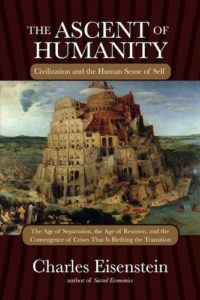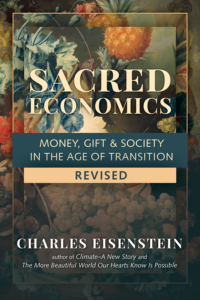Climate — A New Story
Chapters
Chapter 6: A Bargain with the Devil
Nature Trafficking
Imagine for a moment that I had life-and-death power over you. Should I spare your life because you are more valuable to me alive than dead? You might be glad I did, but you will have no security, because what happens when the economics change? What happens when you are no longer valuable to me?
This is no idle speculation. Globally, life-giving resources go toward those who are “valuable” to the global economy. Those whose contributions do not translate into salable goods and services have trouble surviving. In conventional economic terms, they are indeed no more valuable alive than dead, and their ranks are growing. Only if we look at them through a nonfinancial lens, is their worth equal to anyone else’s.[6]
The uniqueness and sacredness of any being disappears when it is reduced to a set of numbers.
The extreme case of human trafficking highlights the resulting degradation, which visits all of us in dilute form whenever we occupy the role of employee or consumer. When we are seen for our monetary value, our well-being ceases to matter except to the extent that it affects that value. The logic is apparent in arguments for employee health programs that cite the cost savings that will result from better health. Fine. But what happens when the costs outweigh the advantages of better health? The self-same logic says: sacrifice health. That’s exactly what often happens when a company discovers a health hazard that would be expensive to fix. “We’ll let that one slide.”
Can we please understand that this is the revolution: to love all beings for themselves and not for their use? When we open to that, it isn’t only our relationship to nature that will change. It also means the transformation of our economic system, which is founded precisely on the exploitation of human beings for profit; i.e., for their use. You probably don’t like being treated that way, as an instrument of someone else’s self-interest, as a consumer, as an employee, whose worth ends as soon as your money runs out or your productivity is exhausted. The beings of nature don’t like it either. All expressions of the mindset of exploitation must change in tandem; each reflects and supports the rest. That is why all the revolutions under way today are the same revolution.
As with human trafficking, so with nature trafficking. Just as economic and political logic does with human populations, carbon accounting enables us to say, “This land is more important than that land. This species is more valuable than that species.” The next step, of course, is to sacrifice the ones we think are less valuable, according to the numbers.
Quantification and monetization go hand in hand. Having evaluated something according to one metric, it is easy to map that onto another metric: money. Once we’ve equated green with low carbon, we can put a price on carbon to align green with money. This is the basic logic behind schemes to “monetize ecosystem services.”
It is also the logic behind a genre of pro-environmental writing exemplified by this Scientific American subheadline: “Fish save the world billions of dollars in damages by helping store carbon dioxide in the oceans.”[7] The article describes a study showing that fish in the high seas avert $74–$220 billion in climate damage per year. That’s a lot more than the economic value of the fishing industry; therefore, the article concludes, we should change our fisheries policy.
Lucky thing for the fish that they are saving us money. Lucky thing for the employees that they are more profitable healthy than sick. Lucky thing for the honeybees that they provide such economically valuable services. But too bad for anything or anyone whose value registers low on our meter.
Do you know that feeling of enchantment on seeing a rare bird or on having a close encounter with an animal, seeing an eagle over the water, a whale spouting in the sea? Can you quantify how much poorer you would be without those beings? Come on, give me a number. Then we will know whether these are worth protecting.
In case you were wondering whether the oceans are worth protecting, the World Wildlife Fund has helpfully put a monetary value on them: $24 trillion.[8] No doubt it hopes to align economic incentive with ecological well-being: a laudable motivation. But think for a moment about the mentality this kind of valuation feeds. It suggests:
- That money is a valid way to assess the value of something like an ocean
- That we can and should make decisions about the planet based on the foreseeable financial gains and losses, and therefore …
- That if we could make more than $24 trillion (say, $48 trillion) by trashing the oceans, then we should do it
- That it is possible to foresee and calculate the contribution of the oceans to human welfare in the first place—that our knowledge is sufficient to qualify us to even make this valuation
- That we can separate out the oceans from the rest of the planet, as if they were a line item on a spreadsheet independent of the rest. So conceivably, we could compensate for the loss of the oceans with more of some other revenue stream.
- That decisions about the oceans should be made based on the effect on human beings; that the oceans themselves and everything living in them have no intrinsic worth. What is important is their economic worth—their value to us.
Clearly, this mentality is part of the problem. At this very moment we are trashing the oceans for the sake of money. I do not know how many trillions of dollars we are making in the process, but when I read of ten thousand seals washing up dead on California’s beaches, or hundreds of beached whales in New Zealand, or sea birds choked with plastic, or disappearing coral reefs, I know that however much we are making, it isn’t enough.
We have to understand that some things are beyond measure and beyond price. This conflicts with the reigning ideology of our time: science says that nothing is beyond measure; economics that nothing is beyond price. Accordingly, we (the dominant culture) have believed that by extending the scope and accuracy of our quantitative reasoning, we will through technology conquer the world, and that by extending the domain of market relationships, we will maximize the efficient production of wealth.
Why then, even as our technologies of control grow more powerful and precise, does the world seem to be spiraling out of control? Why then, even as global GDP reaches new heights, do we experience greater and greater poverty—a poverty from which even the financially rich are not exempt? It is because of what is left out of our measurements, the hard-to-measure and the unmeasurable: beauty, joy, suffering, purpose, pain, sacredness, fulfillment, play … and the sight of seals on the beach, even if they were useless for any other purpose. Yet these are what make life rich.
Ironically, the mindset of instrumental utility, which evaluates all things for how they benefit ourselves, doesn’t even benefit ourselves. That is rather hard to explain in the Story of Separation, except perhaps by saying we have to do a better job at it. We need to be more clever and less shortsighted in our exploitation of everything else for our benefit. But in the Story of Interbeing it is obvious why. In a world of intimate relatedness, harm to one is harm to all. Our efforts at control will always bear a limit; our efforts to measure and predict will never be complete.
Numbers have their place, but if we are to preserve the things on this planet that are beyond price, we cannot rely on math to do it. We cannot scare ourselves into compassion, imagining that properly quantifying the blowback will deter us from wreaking further harm. (Fear for one’s self-interest is what thwarts compassion in the first place.) Nor can we bribe ourselves into love, hoping that we will finally take care of our oceans if only we realize how much money we’d save. The pecuniary mind won’t save us from the destruction generated by the pecuniary mind.
When we appeal to utility as a way to promote sustainability, we implicitly affirm the normalcy and rightness of making decisions on the basis of utility. That is counterproductive, because most of the time, whether you are a business or a consumer, what is of immediate, calculable utility to you does harm to the planet. Self-interest as our culture constructs it says to the mining company, “Strip-mine that forest.” It says to you, “Buy that smartphone made from the strip-mined minerals.” It says, perhaps, we can plant another forest somewhere else to compensate for the lost carbon sink. It also entices us to just go ahead and exploit, because what really contributes to my own personal utility is for someone else—not me—to forgo the minerals, the profits, the smartphone.
If a forest is sacred to you, then how much would I have to pay you to cut it down? No amount would be enough, just as no amount of money would be enough to induce you to offer your mother or child for extermination. When we translate the value of a forest or other ecosystem into a carbon sequestration number, its value becomes just that, a number, something finite. The forest becomes expendable, so long as something of greater value can be substituted.
At best, financial arguments allow the bean counters (inner and outer) to relax their guard and give us permission to act from our love of Earth. “It’s okay. It makes economic sense too.” Unfortunately, they also perpetuate the notion that the ecosystem is, fundamentally, a source of “services”; that the planet is here for us, valuable for its use to us, and not in its own right. The ecological revolution must go deeper than that.
End Notes
[6] Conventional economic theory equates economic value with value to society, through the following logic: Those whose contributions are wanted and needed will find that people are willing to pay for those contributions. Those whose contributions are unwanted will find no market. Those who make the most money do so because they create the most value. The flaws in that argument parallel the problems with any system of quantitative value. The metric used (money, CO2, etc.) may not be an accurate or complete measure of value.
[7] Harball (2014).
[8] Hoegh-Guldberg et al. (2015).






